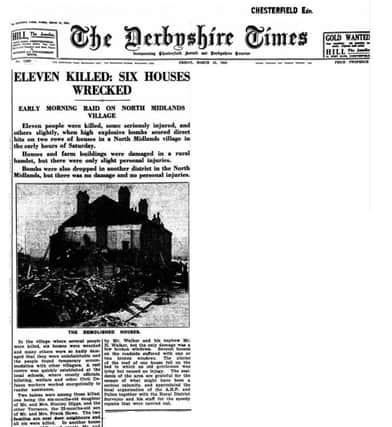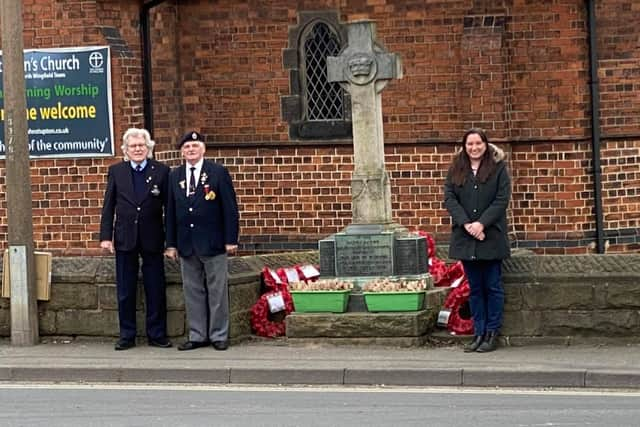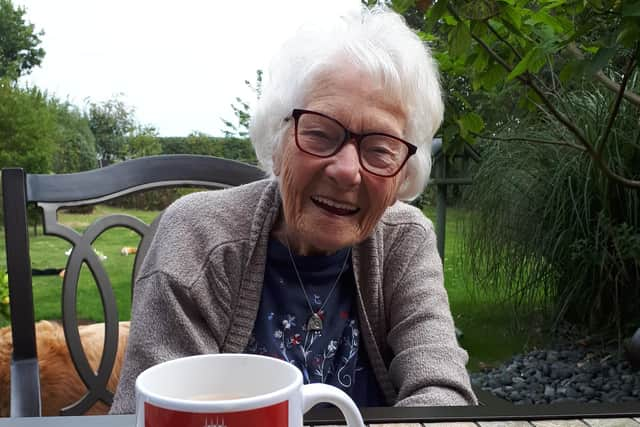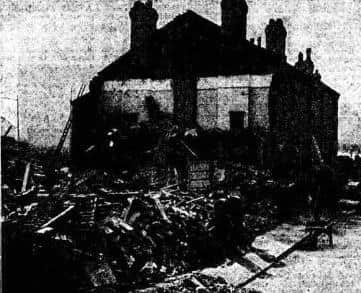‘We were literally blown from our beds by German bombers’ - recollections of night when 11 Tupton people lost their lives


The village suffered the biggest loss of civilian life in one day of any rural community in Derbyshire during the Second World War.
Three bombs were dropped, two were direct hits on houses and demolished six homes.
Advertisement
Hide AdAdvertisement
Hide AdAmong those who died were the six-month-old daughter of Mr and Mrs Stanley Higgs and 22-month-old Terrence, the son of Mr and Mrs Frank Howe.


Miraculously, another baby, Peter Lee, survived a blast which seriously injured his 18-year-old aunt, who died shortly after arrival at hospital, and his mum. Rescuers found little Peter Lee unharmed in his pram, protected by its hood.
The 80th anniversary of the tragedy will be marked on March 15 with wreath-laying at the war memorial by the Royal British Legion and Tupton Parish Council. The community garden at the top of Ward Street, close to where the bombs caused the biggest devastation, will have a new bench bought by the parish council.
Memories of that fateful night were contributed by Mabel Marshall, who is now in her nineties, to Tupton Local History Society.
Advertisement
Hide AdAdvertisement
Hide AdMabel said: "We were literally blown from our beds by German bombers, no air raids had sounded so we were not taking refuge in our cellar. Every window was blown out and our huge stone doorstep had been ripped up and flung down our garden. Our outside toilets and wash houses were flattened. Sadly our neighbours to the right of our gennel near King Edward Street suffered the most taking a direct hit; the whole terrace was wiped out by the impact of bombs and fires. Bombs were dropped that night on Ward Street and Queen Victoria Road near Henstocks old shop and a large crater was left in on waste ground off Cross Street.


"In Chapel Street my elder brother and his wife awoke to see the moon shining in the sky as their roof had been blown off.”
Recollections of the terrifying night will be aired in a digital talk on Monday night. The presenter John Stamp, who was born at White House Farm, off Queen Victoria Road, recorded his late mum Kitty’s reminiscences about the bombing.
One of the three bombs landed in a field, sending up debris which landed on Kitty and her husband Tommy’s farmhouse.
Advertisement
Hide AdAdvertisement
Hide AdJohn said: “Mum and dad were extremely fortunate to escape injury as the crater debris came through the roof into their bedroom. They awoke, terrified, to find themselves looking at the sky where the roof had been.


"One lasting impression of the bombers left was in the area in the woods surrounding Tupton Hall School, called Monkey Hollow. The deep crater in the woods is said to be the result of one of the bombs.”
Why bombers chose to hit Tupton remains a mystery. Suggestions were that the pilots may have been targeting the nearby London to Sheffield railway line or offloading their cargo as they flew back to Germany after a raid on Sheffield.
To find out more about the bombing of Tupton, tune into John’s talk on Monday. The talk is hosted by Tupton Local History Society, via Zoom; email:
[email protected] to get the link.